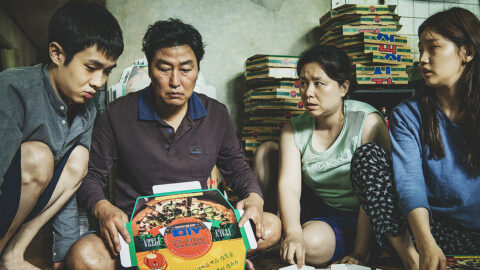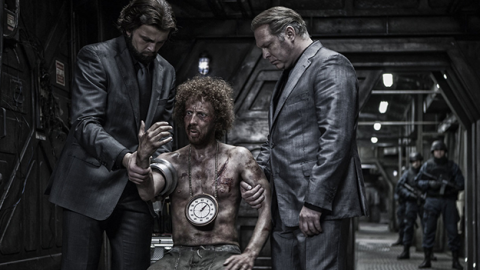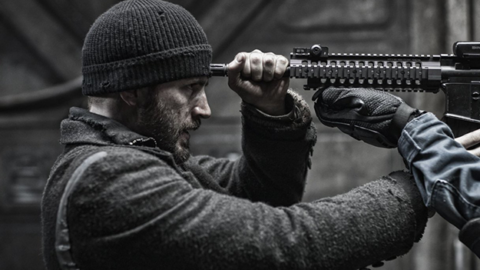By Amy Taubin in the September-October 2019 Issue
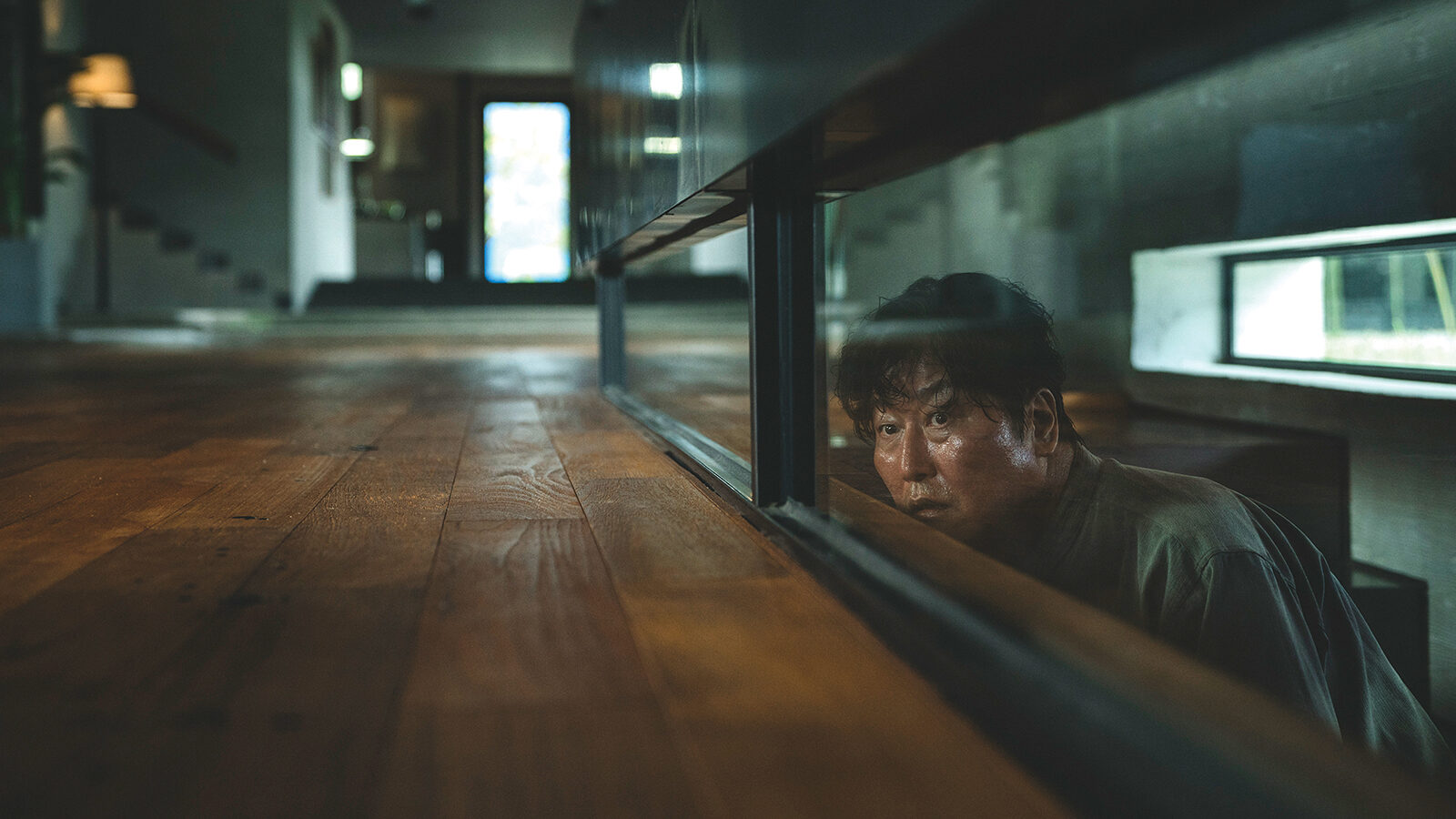
A House Divided
Part twisty social thriller, part heart-stopping tragicomedy, Bong Joon-ho’s tour de force Parasite locks two families on either end of the wealth gap into a deadly embrace
At the Cannes Film Festival, where Bong Joon-ho’s Parasite won the Palme d’Or, the director asked critics not to reveal anything about the film past the initial setup. One of the joys of going to festivals is that you can discover movies without noisy criticism getting in the way of your own first impression. So fair warning: if you want to replicate that experience, don’t read this piece until you’ve seen Parasite, because I’m going to give a great deal of the game away. It’s too extraordinary a film to dance around.
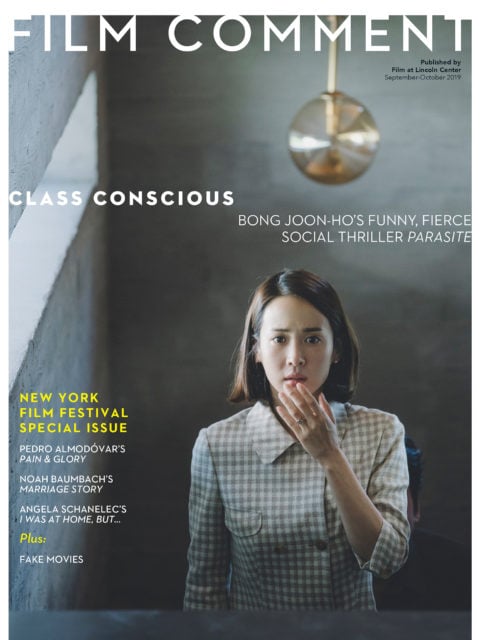
From the September-October 2019 Issue
Also in this issue
Late in the twisty, class-warfare family tragicomedy that is Parasite, Ki-taek, the head of a family of four that never had much and now has lost every bit of that, is lying on his back on the floor of a crowded shelter, next to his wife, Chung-sook; his son, Ki-woo; and his daughter, Ki-jung. Ki-woo asks his father what he plans to do, and Ki-taek responds that he has no plan, and then, without turning his head—his broad face almost filling the frame—he closes his eyes and slowly covers them with his forearm. Ki-taek is played by Song Kang-ho, a Korean box-office favorite, one of the world’s greatest actors, and an axiom of Bong’s cinema. The characters that Song has played in Bong’s films—the overly confident, defensive small-town detective in Memories of Murder (2003); the father desperate to save his daughter from the Han River lair of a giant amphibious mutant in The Host (2006); the taciturn rebellion leader who sacrifices his life in the hopes of freeing his daughter from the mobile concentration camp in Snowpiercer (2013)—all have plans, no matter how risky and ill-conceived they might be. The gesture that Ki-taek makes suggests total despair, and as we soon see, an abdication of any rational resistance to the rage and resentment that overwhelm him. All of Bong’s films find cause with the marginalized, the abused, and the oppressed without sentimentalizing or heroizing them. But Parasite is the first of his films to offer no hope of any lasting change. In that sense, Parasite takes off from a moment near the end of Okja (2017), which begins as a charming fairy tale about a young girl on a journey to save her companion animal, a giant pig, only to land her in an abattoir, ankle-deep in blood. The fairy tale is over, as Okja takes off the genre gloves and becomes a protest of one of the pillars of capitalism: factory farming.
When I interviewed Bong about Okja, he said that conditions in the slaughterhouses he visited were even more horrific than those in the film. He said something similar when I interviewed him in Cannes about Parasite. I asked if the film represents a dystopic near-future. He answered that, to the contrary, it was set in the present day and that there are neighborhoods in Seoul where poverty is even direr than in the neighborhood in the film where Ki-taek’s family lives. And that the actual gap between the rich and the poor is as unbridgeable as he showed it to be. In the press notes, Bong describes Parasite as “a story that could very well take place in the real world . . . it’s a quite realistic drama, but I wouldn’t object if one were to call it a crime drama, a comedy, a sad human drama, or a horrific thriller.”

Parasite (Bong Joon-ho, 2019)
It is all of those, but, to be more specific, one could add the modifier “upstairs/downstairs” to all the categories Bong mentions and the film embraces. Parasite opens inside the crowded, messy basement where Ki-taek’s family lives. They are all at home because they are all unemployed, except for a gig folding pizza boxes, and they are soon fired from that. The opening shot is a view of the street through the grimy basement windows, with drying laundry blocking most of the light. As the camera slowly descends, we see that these are not floor-to-ceiling windows and that as low as the family has fallen, they haven’t quite hit bottom. Most of this opening scene centers on a search for a Wi-Fi signal, which involves them climbing on every object that can get them closer to the ceiling, including the toilet and the sink. At this point the film seems to be a broad comedy in which the concept of the underclass is visualized as slapstick. That style will continue to the very end, but while gradually mixing with darker genre elements, and climaxing in a children’s party that turns into a Grand Guignol massacre.
This combination of comedy and horror is a genre film staple, but in most cases the dynamic plays out in the audience, who laugh at themselves for being scared by routines they’ve seen a hundred times. In Bong’s films, it’s the characters who are almost always in the grip of mixed emotions, which cause them to respond to their situations in surprising and seemingly inappropriate ways. Bong often explains in interviews that this layering of emotions is what makes people fully human. While the ingenuity of the family members and the affectionate encouragement they give one another in the opening scene suggest a comedy, there are already signs that their good humor is strained by frustration about being out of work and living in squalor. When Ki-woo (Choi Woo-shik), who has already failed his college entrance exam four times, receives an offer from a friend to substitute for him as a tutor to a wealthy teenage girl, he jumps at the chance. His friend believes that Ki-woo won’t have a problem passing as a college student, and in addition, he trusts that Ki-woo won’t be romantic competition the way his drunken college chums might be. Having successfully gained the trust of the wealthy parents, Ki-woo then recommends Ki-jung (Park So-dam), claiming he’s heard of her reputation as a genius art therapy teacher, to tutor the family’s grade-school son, who is wildly spoiled and has an obsession with Native American paraphernalia, including tomahawks. (As Chekhov famously remarked, the gun that appears in the first act must be employed in the last. So too with tomahawks.) The two sibs then frame the family’s chauffeur and cook—the former as a lecher, the latter as a TB carrier—and once they are fired, recommend two people for their jobs who are, of course, their parents, bearing forged IDs and resumes.
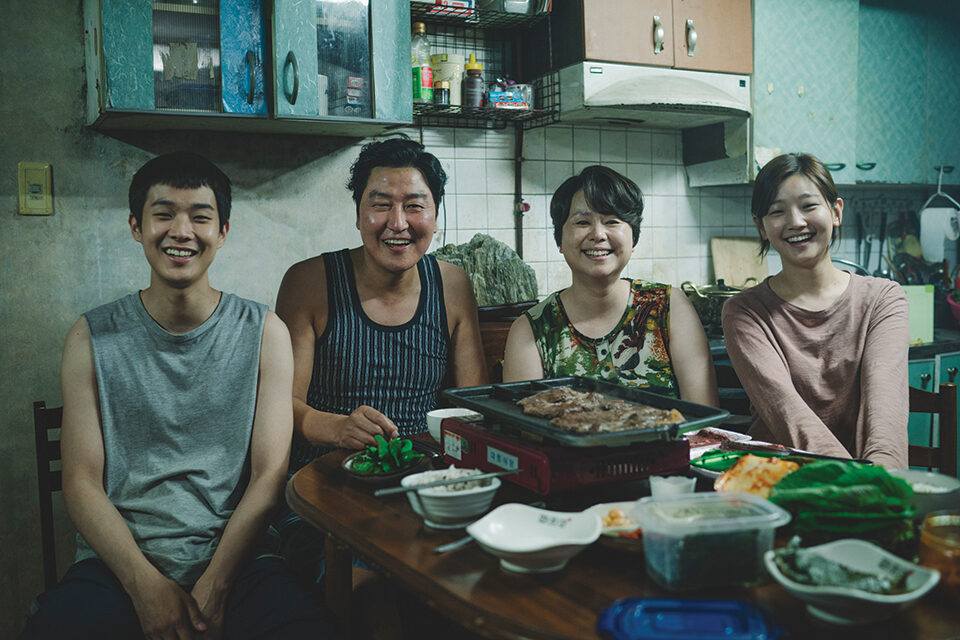
Parasite (Bong Joon-ho, 2019)
In 2013, when Bong conceived the film that would become Parasite, the working title was Decalcomania. In Korea, “decal” is synonymous with doppelgänger. Parasite presents two families that are mirror opposites, living in homes that are also mirror opposites. In contrast to the dank, dark basement of the poor family, where every inch is crammed with stuff because they can’t afford to throw anything away, the home of the rich family is light-filled and spacious, with built-in closets and cabinets so that neither the necessities nor the luxuries of daily life defile the pure architectural design. The poor family’s basement is located at the very bottom of the exterior stairways that connect the streets of their crumbling neighborhood. The rich family’s house sits at the top of a hill and is accessible by foot only by making another climb up a private staircase. Almost the entire film takes place within these two homes, a brilliant achievement by set designer Lee Ha-jun because they never seem like anything other than actual locations. Bong explained that the tasteful minimalist house is a copy of ones built by an architect favored by nouveau riche IT millionaires, which is what Mr. Park, the paterfamilias of the wealthy family, is. Hong Kyung-pyo’s cinematography is no less striking while neither expressionistic nor stylized. He shoots the light-flooded Park residence and the lawn outside the floor-to-ceiling windows so that the focus is immaculate as far as the eye can see. In contrast, you feel as if you need to squint to see through the thick, mold-laden air in the basement where the poor family is crammed together. The place seems waterlogged (homeless men regularly piss outside the window) even before an apocalyptic rain causes all the sewers in the surrounding blocks to back up and drain into the basement through a carelessly open window.
When Ki-taek, in the shelter, closes his eyes and covers them with his arm, his despair is not simply because the flood cost his family their only home but also because by then he has seen how rich people live and understands that that life will never belong to him or his family. For Mr. Park, Ki-taek is just a person who smells bad, like all people who take the subway. Bong explained that this turning-point moment in Parasite was added to the last version of the script. He said that while storyboarding the scene, he felt extremely sad when Ki-taek says, “I have no plan.” That’s when the image of Ki-taek covering his closed eyes with his arm came to him. He asked Song about it, and the actor agreed that the gesture was right. Bong added that the chaos of the climactic scene derives from that moment when Ki-taek gives up on making plans, thus removing the only constraint on a lifetime of repressed rage.
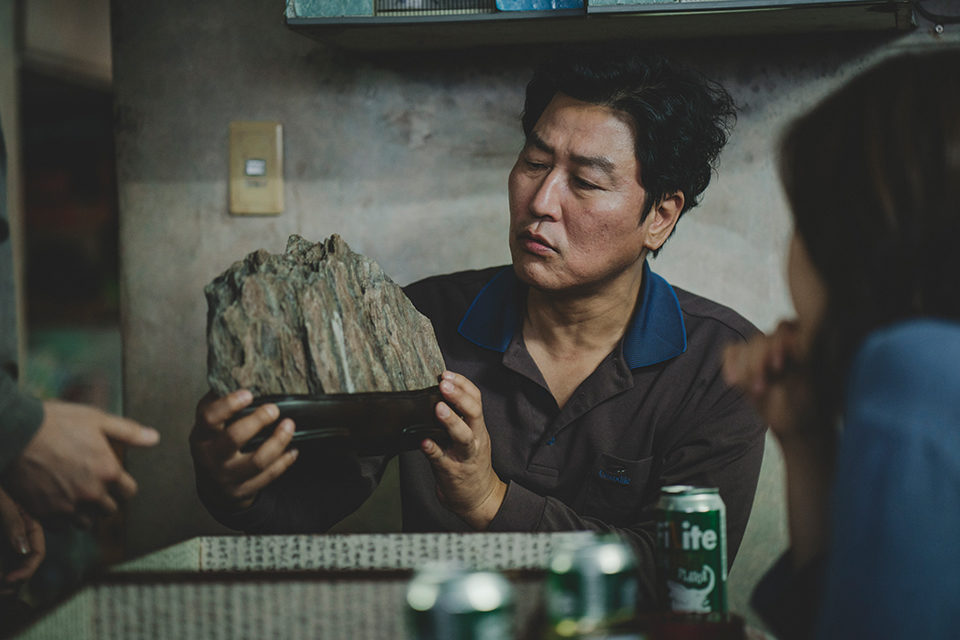
Parasite (Bong Joon-ho, 2019)
To the upstairs/downstairs doppelgänger mash-up, Parasite adds a home-invasion element, albeit one that at first seems nearly benign. The poor family “invades” the rich family’s home, not to rob or kill them, but merely to do a day’s work for a day’s pay. The problem is that in conditions of extreme economic inequality, the relationship between boss and worker is necessarily parasitic, though who is the parasite depends on one’s point of view. The film eschews taking sides, and although Bong’s sympathies are with the poor family, he doesn’t give them the high moral ground. While Ki-woo and Ki-jung get their jobs under false pretenses, they relate to the Park kids better than the kids’ helicopter parents do. But their dog-eat-dog behavior in concocting a string of lies, so that the gullible rich parents fire their chauffeur and longtime housekeeper and accept the recommendations of two newbies as to who should replace them, confirms that working-class solidarity counts for nothing when poverty makes people desperate and capitalism inflames the desire for riches. Of course, the dog that has been thrown out (the housekeeper) comes back to bite them all, and to metastasize the doppelgänger story beyond control. That is because Chung-sook (Chang Hyae-jin) now has two doppelgängers—Mr. Park’s wife and the former housekeeper. And the latter has returned to attend to something personal down many flights of stairs in a sub-basement, the existence of which is unknown by some and disavowed by others, until she opens the door.
Please don’t reveal what’s in the basement, was Bong’s specific request to me in our interview, and I’ll honor it, although I know that if you are reading this essay, you’ve already seen the film. I’ll focus instead on a moment no less intense than the one when Ki-taek puts his arm across his eyes. The two are similar in that they deal with things that must remain unseen lest they rupture the world beyond repair. When the housekeeper comes up the stairs from the secret basement and stands in the doorway before emerging into the living room, Chung-sook reacts, instantaneously, to the threat she presents by delivering a backwards kick of such speed and force that the poor housekeeper tumbles down the stairs and fractures her skull. One of the most hilarious sight gags you’ve ever seen results in tragedy. Lasting just a few seconds, the sequence distills the mixture of comedy and tragedy at the heart of Bong’s oeuvre, but never executed with such sustained passion and virtuosity as in Parasite.
Amy Taubin is a contributing editor to Film Comment and Artforum.



